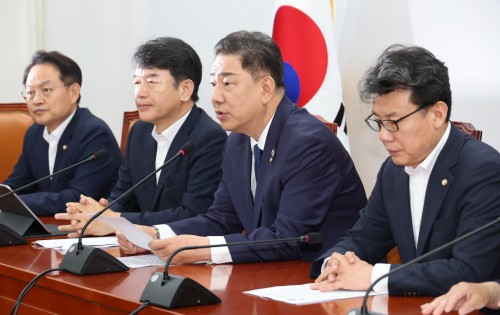 |
| Kim Byung-ki (third from left), acting leader and floor chief of the Democratic Party, speaks during a party strategy meeting at the National Assembly in Seoul on July 29. Kim vowed to swiftly pass key reform bills blocked by the previous Yoon Suk-yeol administration during the July extraordinary session. / Source: Yonhap News |
South Korea’s ruling Democratic Party is accelerating its push for stricter corporate governance reforms and the controversial “Yellow Envelope Act” (Labor Union Act Articles 2 and 3) despite mounting concerns from businesses over regulatory pressure.
On July 29, the National Assembly’s Environment and Labor Committee, led by the Democratic Party, passed the Yellow Envelope Act, with the party aiming to bring it to a full floor vote on August 4. The move follows the recent passage of amendments to the Commercial Act mandating cumulative voting for large listed firms with assets over 2 trillion won and requiring the separate election of at least two audit committee members, aimed at bolstering minority shareholder rights.
The Yellow Envelope Act would require parent companies and major corporations to negotiate even when strikes originate from subcontractors, raising fears of more frequent labor disputes. The bill also significantly limits damage claims against workers involved in illegal strikes, prompting critics to warn that it effectively creates “strike-friendly workplaces” that could disrupt production, delay exports, and unsettle global supply chains.
Concerns are also growing among foreign investors. The European Chamber of Commerce in Korea (ECCK) cautioned that “an expanded and vague definition of employers, combined with numerous criminal liability provisions, risks branding executives as potential criminals and discouraging business operations.” It warned that legal risks from unclear labor negotiations could push foreign firms to exit the Korean market.
Labor Minister Kim Young-hoon pledged to faithfully implement the law’s intent to “build participatory and cooperative labor relations that can underpin sustainable growth.” The ministry is reportedly reviewing changes to enforcement decrees and regulations to clarify collective bargaining procedures under the revised law.
At the same time, President Lee Jae-myung’s administration is preparing its first tax overhaul, which would raise the corporate tax rate from 24% to 25% and increase the securities transaction tax. Analysts warn that these measures could hinder Lee’s “KOSPI 5000” pledge, as sustained market growth hinges on strong corporate performance.
Nonetheless, the progressive bloc, backed by labor unions, appears poised to advance labor-friendly legislation, including amendments to the Labor Standards Act.
Most Read
-
1
-
2
-
3
-
4
-
5
-
6
-
7





















